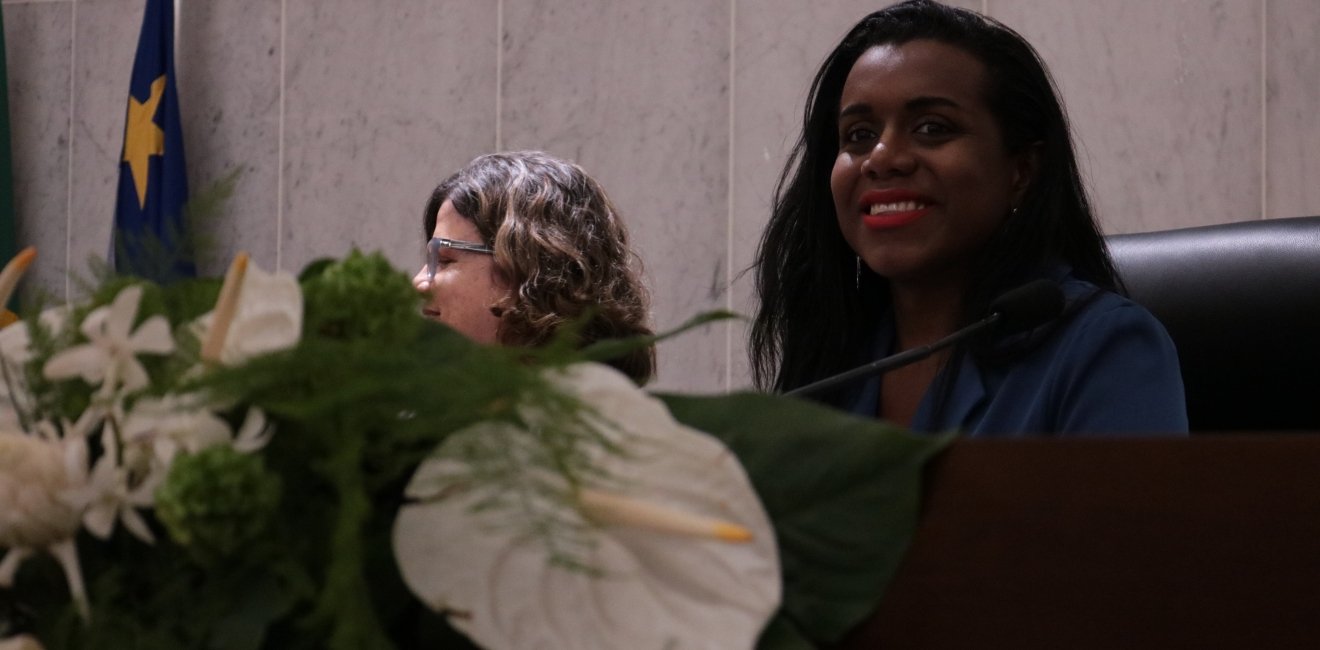
A blog of the Wilson Center
This interview is also available in Portuguese, following the English version below / A entrevista está disponível em português, sob a versão em inglês.
Robeyoncé Lima, a lawyer and activist, is the first trans woman politician to be elected in the state of Pernambuco. In 2017, after graduating from the Federal University of Pernambuco (UFPE), Lima became the first trans lawyer to join the Brazilian Bar Association (OAB) in her state. She was elected a state deputy for Pernambuco in 2018 through the collective candidacy JUNTAS (PSOL).
The following conversation has been condensed and edited for clarity. The views and opinions expressed below are the interviewee's own, and do not necessarily reflect the views of the Brazil Institute or the Wilson Center.
Why did you decide to run for state deputy?
The decision emerged from an invitation to participate in a collective candidacy[1] with four other women: Carol Vergolino, Joelma Carla, Kátia Cunha, and Jô Cavalcanti. The five of us decided to unite our efforts for political leadership in a new sort of campaign, because together we are stronger. Through the partnership, we are better able to combat our dissatisfaction with a political system that does not represent us, and never has. This dissatisfaction inspired us to run for office to try to change politics.
How will your work as an attorney help or affect your work as state deputy?
Before I became a state deputy I was an attorney, and based on my belief in activism, I took many pro bono cases to help LGBTQ+ friends secure their judicial rights. However, this pro bono advocacy was focused on individuals—helping a specific lesbian, gay, or trans person. But from the moment you become a public figure, you realize that it is more effective to provide support on a larger scale. In professional terms, the biggest difference has been to stop providing support to one person and start providing support to an entire group of people, through public policy.
Can you talk about your collective candidacy JUNTAS 50180? Why did you decide to join? How did you meet the other candidates and what were, in your opinion, the main priorities of the collective candidacy?
Our collective candidacy JUNTAS has a certain pioneering spirit here in the state of Pernambuco, but there were precedents in other states. Some examples include Áurea Carolina’s collective cabinet in Minas Gerais and a group in Alto Paraíso [in the state of Goiás] at the city-council level. The number 50180 highlights our feminist agenda and was chosen precisely because 180 is the phone number of “Disque Denúncia,” a hotline for reporting violence against women. The number 50 refers to our party, the Socialism and Liberty Party (PSOL).
I decided to join JUNTAS because of my dissatisfaction with politics and because I thought that protesting was important but not sufficient. What is truly important is to start a sort of institutional protest in decision-making environments. When I met the other JUNTAS candidates, several were already interested in running for office individually, so the idea of a collective candidacy emerged based on the precedents I mentioned. We hoped that a collective candidacy would give us greater strength and increase the possibility of being elected.
The most important issue for JUNTAS, which we represent with our own bodies, is the presence of women in politics and in positions of power. The simple fact that we are in the Legislative Assembly is a step towards reversing the cruel statistic that in the 180 years of the assembly, we have had more than 1,000 men serve as deputies but fewer than fifty women. The fact that we are occupying these seats helps pave the way, little by little, towards changing this statistic and the sexism in politics that discounts the role women can play in creating public policy.
What is your main legislative goal as deputy? What are some public policies you want to prioritize or bills you want to propose?
We always talk about the prioritization of people’s lives. We are [living] in a moment in which we are losing our rights, the right to life being the most paramount. In terms of public safety, and [ensuring] cities are safe for people, including LGBTQ+ people, we need to study and evaluate how to use our mandate to improve people’s quality of life and secure the right to life that is being threatened. As a result, one of our top priorities is people’s lives, their safety, so that trans women and travestis[2] can go out in public and return home alive.
In your experience, have you faced resistance or prejudice against the participation of trans people, Afro-descendants, and women in politics? What is the best way to overcome this?
When we get into politics, the system pushes us to conform to the cis-normative[3] and white standards that govern politics. I always try to confront and oppose these pressures to change who I am. For instance, I have heard people say that JUNTAS is not [made up of] five women, but four and a half, referring to the fact that I am a pre-operative trans woman. So, at the same time that we are fighting to prevent the system from altering us, we are gradually altering the system by bringing new, more inclusive, and less conservative standards.
Being the first trans deputy is already a strong symbol for the LGBTQ+ community in Pernambuco and in Brazil. How do you think your election can change the way trans people in Pernambuco participate and think about politics?
Here in Pernambuco I was elected as a trans deputy but I was also accompanied by two other trans deputies who were elected in São Paulo: Erika Hilton, elected through a joint candidacy from the Bancada Ativista; and Erica Malunguinho, elected in the standard way as an individual. So, I share with these two girls the pioneering spirit of trans deputies revolutionizing politics.
Now, we want our leadership to serve as an example for other trans girls to occupy this institutional space. We cannot just be relegated to the street corners of prostitution. Who would have thought that we would have trans deputies in the states of São Paulo and Pernambuco today? We have proven that nothing prevents us from electing many other travestis to city councils in the 2020 municipal elections.
What are your observations on the first months of the Bolsonaro administration?
What I have observed in particular is an intensification of the oppression of the less-favored social strata. Before the Bolsonaro administration, before the coup against President Dilma, we did not have a perfect world and we were already living in precarious situations. However, with this new government, we see the intensification of this oppression. My fear of leaving home and not returning alive is older than this administration. They are trying to [use] this fear to immobilize us and prevent us from claiming our rights and [continuing] our fight. That is why we cannot let fear imprison us—because if we stay still, we will not be able to see the chains that imprison us, as Rosa Luxemburg said.
Several of JUNTAS’s policy proposals contradict the proposals of the federal government, one example being the issue of education about gender diversity and sexuality in schools. How, within the federal system and perhaps through civil society, do you intend to respond to federal government initiatives on these issues?
In terms of agenda items that are in clear contradiction to the federal government’s priorities, we have limited room for action because, while the federal government prioritizes conservatism, we are coming with a revolutionary proposal—but at the state level, which puts us at a disadvantage in any ideological clash with the federal government. However, we have party colleagues who were elected as federal deputies and who can therefore take a leading role on these issues in Congress. We have our friends Áurea Carolina and Taliria Petrone and our colleagues Marcelo Freixo and Jean Wyllys, who unfortunately is no longer [in Brazil] with us because he preferred to preserve his own life, as he was being threatened. Thus, we will be able to advance our agenda through communication between state and federal deputies.
What are the biggest issues and challenges faced by trans people in Brazil?
The biggest problem in general is the infringement of rights, especially the infringement of the right to life, given that we are in a country that kills the greatest number of LGBTQ+ people in the world. While we have seen some progress for the LGBTQ+ movement in Brazil, we continue to see LGBTQ+ people dying in the streets. It is not helpful, for example, for a travesti to have her identified gender recognized by a notary public office[4] by day, if she is then assassinated by night in a transphobic attack on the street corner where she works as a prostitute. Dead LGBTQ+ people cannot enjoy any rights. So the biggest challenge for the LGBTQ+ community is to try to reverse that statistic. For this, we must promote dialogue with society. People are taking our lives because they see us as animals, they have not had gender and sexuality education in schools.
Are you optimistic about the future of women, the LGBTQ+ community, and Brazilian Afro-descendants in society and in politics in Pernambuco and in Brazil?
I am optimistic because the people who have placed this government in Brasília are slowly starting to become disappointed. People are opening their eyes to this far-right government, this government based on conservatism. So, there is the chance that dissatisfaction in the national sphere will bring good results in the municipal elections of 2020. In other words, there is a strong possibility that what happened in the United States will occur here in Brazil, where first there was the election of President Trump, who brought right-wing ideas and conservatism, but after two years, in the local elections, there was a reversal with Latinas, black women, and LGBTQ+ people being elected. I think this revolution is possible in Brazil too.
[1] Collective candidacies, where a group of people runs for a single seat, are an experiment in Brazilian politics and are not currently recognized by Brazil’s electoral commission. In practice, therefore, these groups choose one of their members to serve as the official candidate. This person’s name will appear alone on the ballot and, if successful, the mandate will officially be this person’s alone. Nonetheless, these groups generally pledge to work and reach decisions as a group, with the members on strictly equal footing. Examples include the Activist Bloc in the São Paulo state legislature, first elected in 2016 and, as Deputy Lima mentions, a collective mandate which holds a city council seat in the state of Goiás, also first elected in 2016.
[2] Travesti is a Brazilian Portuguese term that refers to men born male but who possess or cultivate feminine identities and forms of embodiment.
[3] The assumption that all human beings are cisgender, i.e. have a gender identity which matches the sex they were assigned at birth.
[4] In Brazil, the notary public office (cartório) is an official government organ, where people can register births and deaths, marriages and divorces, certify wills and contracts, and other administrative activities.
--
Por que você decidiu se candidatar a deputada estadual?
A decisão de me candidatar a deputada estadual surgiu primeiramente do convite de participar de uma candidatura coletiva junto com outras quatro mulheres: Carol Vergolino, Joelma Carla, Kátia Cunha e Jô Cavalcanti. Eu e essas quatro mulheres resolvemos unir forças nesse protagonismo político, nesse novo jeito de fazer uma candidatura, pois juntas somos mais fortes. Assim, temos mais força para combater nossa insatisfação com esse sistema político que não nos representa e nunca nos representou. Essa insatisfação fez com que a gente se candidatasse para tentar mudar a política de alguma forma.
Como a sua formação como advogada judiciária ajudará, ou afetará, o seu trabalho como deputada?
Antes de me tornar deputada, eu já era advogada e, na minha militância como advogada, eu fazia muita advocacia pro bono para ajudar outras amigas e amigos LGBTs em busca do seu direito no judiciário. Mas essa advocacia pro bono antes de me tornar deputada era uma advocacia voltada para a ajuda individual, de uma determinada pessoa, de uma determinada lésbica, de uma determinada trans, de um determinado homossexual. Mas a partir do momento que nos tornamos figura pública, percebemos que é mais estratégico dar apoio num âmbito mais coletivo. Então, em termos profissionais, a maior mudança foi deixar de atender a uma pessoa ou outra para atender a toda uma categoria de pessoas através de políticas públicas.
Você pode falar um pouco mais sobre a sua candidatura coletiva JUNTAS 50180? Por que você decidiu entrar? Como você conheceu as outras candidatas e quais eram, na sua opinião, as pautas mais importantes da sua candidatura coletiva?
Esse projeto de candidatura coletiva das JUNTAS tem um certo pioneirismo aqui no estado de Pernambuco, mas traz como precedente a própria gabinetona da companheira Áurea Carolina em Minas Gerais e o pessoal do Alto Paraíso no âmbito de vereança. O nosso número é 50180 pois busca trazer questões da pauta feminista e foi escolhido justamente porque o 180 é o número do Disque Denúncia de violência contra mulher e o 50, claro, é a sigla partidária que não podemos deixar de colocar na legenda.
Eu decidi entrar na JUNTAS pela própria insatisfação com a política, por pensar que fazer militância de rua é importante mas não é suficiente. É necessário fazer uma militância institucional em ambientes de tomada de decisão. Quando conheci as outras codeputadas desse projeto político, algumas já estavam querendo se candidatar individualmente, então surgiu a ideia com base nos precedentes de se candidatar coletivamente para ter mais força e uma possibilidade maior de conseguir uma cadeira institucional.
A pauta mais importante da JUNTAS, que já trazemos com nossos próprios corpos é a presença da mulher na política em locais de tomada de decisão. O próprio fato da gente estar lá tem o sentido de reverter as estatísticas cruéis de que em 180 anos de Assembleia Legislativa tivemos mais de 1.000 homens deputados e menos de 50 mulheres. Então, o fato de estarmos ocupando essa cadeira ajuda aos poucos a abrir caminho para reverter essa estatística e a política machista e misógina que não leva em consideração o potencial da mulher nas construções coletivas de política pública.
Qual é o seu primeiro objetivo legislativo como deputada? Quais são algumas outras prioridades em relação a políticas públicas ou atos que você pretende propor?
Nós trazemos muito a questão da priorização da vida das pessoas. Estamos num contexto de perda de direitos, sendo o principal o direito à vida. Nessa questão de segurança pública, a questão de cidade segura para as pessoas, inclusive para pessoas LGBTs, precisamos estudar e analisar como podemos utilizar o instrumento do mandato para melhorar a qualidade de vida das pessoas e trazer o direito à vida que está sendo ameaçado. Assim, uma das nossas maiores prioridades é justamente a vida das pessoas, a segurança para que as mulheres trans e travestis saiam para a rua e voltem para casa com vida.
Na sua experiência, você já enfrentou resistência ou preconceito à participação de pessoas trans, mulheres e Afro-descendentes na política? Qual é a melhor maneira de superar isso?
Quando nós entramos na política, esse sistema político exige que a gente se desconfigure para se adequar aos padrões cis normativos e embranquecidos que regem a política. Eu tento sempre enfrentar essa tentativa do sistema de me desfigurar. Por exemplo, eu já ouvi pessoas dizerem que as JUNTAS não são cinco mulheres, e sim quatro e meia, se referindo ao fato de que eu sou mulher trans e não operada. Então, ao mesmo tempo que lutamos para evitar que o sistema nos desconfigure, vamos aos poucos desconfigurando esse sistema, trazendo novos padrões mais inclusivos e menos conservadores.
Ser a primeira deputada trans já constitui um símbolo forte para a comunidade LGBT em Pernambuco e no Brasil. Como você acha que a sua eleição pode mudar a forma como as pessoas trans em Pernambuco participam e pensam sobre política?
Eu aqui em Pernambuco me elegi como deputada trans mas também fui acompanhada por duas outras deputadas trans que se elegeram em São Paulo; A Erika Hilton, que se elegeu pela mandata coletiva da Bancada Ativista e a Erica Malunguinho que se elegeu individualmente no sistema padrão individual. Assim, eu compartilho com essas duas meninas o pioneirismo de deputadas trans revolucionando a política.
Agora, queremos que o noso protagonismo sirva como referência para que outras meninas trans ocupem esse espaço institucional. Não podemos ficar apenas relegadas às esquinas da prostituição. Quem diria que a teríamos hoje deputadas trans no Brasil, nos estados de Pernambuco e São Paulo? Provamos que nada impede que tenhamos muitas outras travestis nas câmaras municipais do Brasil a partir da eleição de 2020 de âmbito local para vereança e prefeituras.
Quais são as suas observações sobre o primeiro mês do governo Bolsonaro?
O que eu particularmente tenho observado é justamente uma intensificação das opressões das camadas sociais menos favorecidas. Antes do governo Bolsonaro, antes do golpe contra a presidente Dilma, nós não tínhamos um mundo perfeito e já vivíamos em situações precárias, mas, com esse novo governo, vemos a intensificação dessas opressões. O meu medo de sair de casa e não voltar para casa com vida é mais antigo que esse governo. O que estão tentando fazer é que esse medo não nos deixe nos mover para reivindicar nosso direitos e a nossa luta. Por isso não podemos deixar esse medo nos aprisionar, porque se não nos movemos, não percebemos as correntes que nos aprisionam, como diz a companheira Rosa Luxemburg.
Algumas propostas da JUNTAS estão, evidentemente, em contradição com as propostas do governo federal, por exemplo a questão de educação sobre a diversidade de gênero e de sexualidade em escolas. Como, dentro do sistema federal e talvez através da sociedade civil, você pretende responder às iniciativas potenciais do governo federal nesse temas?
Em termos de pautas que são claramente contraditórias ao governo federal, temos atuação limitada pois, enquanto o governo federal prioriza o conservadorismo, chegamos com uma proposta revolucionária, porém em âmbito estadual, o que dificulta um embate ideológico dialogável com o governo federal. Entretanto, também temos companheiras de partido que conseguiram se eleger como deputadas federais que podem fazer essa linha de frente no protagonismo de enfrentamento no congresso federal. Temos as companheiras Áurea Carolina e Taliria Petrone e os companheiros Marcelo Freixo e Jean Wyllys, que infelizmente não está mais conosco pois preferiu zelar pela sua própria vida, uma vez que estava sendo ameaçado. Assim, conseguiremos avançar as nossas pautas através de uma comunicação entre deputados estaduais e federais.
Quais são os maiores problemas e/ou desafios enfrentados por pessoas trans no Brasil?
O maior problema de uma maneira geral é exatamente essa retirada de direitos e, mais precisamente, do próprio direito à vida, visto que estamos no país que mais mata LGBTs no mundo. Assim, embora tenhamos visto um certo avanço em pautas LGBTs no Brasil, continuamos vendo pessoas LGBTs morrendo nas ruas. Ou seja, não adianta, por exemplo, uma travesti conseguir retificação de nome em cartório durante o dia e ser assassinada por um ataque transfóbico na noite desse mesmo dia na esquina de onde ela se prostitui. Uma LGBT morta não tem condições usufruir dos seus direitos. Então, o maior desafio da comunidade LGBT é tentar reverter essa estatística. Para isso, devemos promover um diálogo com a sociedade, pois as pessoas estão tirando as nossas vidas porque veem como animal, não tiveram educação de gênero e sexualidade nas escolas.
Você é otimista ou não sobre o futuro das mulheres, da comunidade LGBT e dos afrodescendentes brasileiros na sociedade e na política em Pernambuco e no Brasil?
Eu sou otimista porque as pessoas que colocaram esse governo em Brasília aos poucos estão começando a se decepcionar. As pessoas estão abrindo os olhos para esse governo de extrema direita, esse governo pautado no conservadorismo. Então existe a chance de que a insatisfação na esfera nacional provoque uma insatisfação geral que trará bons resultados nas eleições municipais de 2020. Ou seja, há uma forte possibilidade de ocorrer aqui no Brasil o que ocorreu nos EUA, onde tivemos a eleição do presidente Trump, que trouxe ideias de direita e conservadorismo, mas depois de 2 anos, nas eleições locais, tivemos uma reviravolta com latinas, mulheres negras e pessoas LGBTs se elegendo. Por isso acho que essa revolução também é possível no Brasil.
Author


Brazil Institute
The Brazil Institute—the only country-specific policy institution focused on Brazil in Washington—aims to deepen understanding of Brazil’s complex landscape and strengthen relations between Brazilian and US institutions across all sectors. Read more

Explore More in InoVozes
Browse InoVozes
Interview with Marcelo Calero, Career Diplomat and Federal Deputy

Interview with Tiago Mitraud, Federal Deputy and Leader of RenovaBR

Interview with Júlia Lucy, First-Term District Deputy in Brasília

